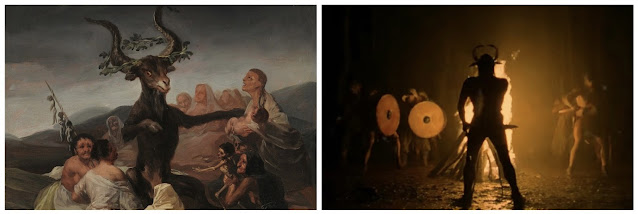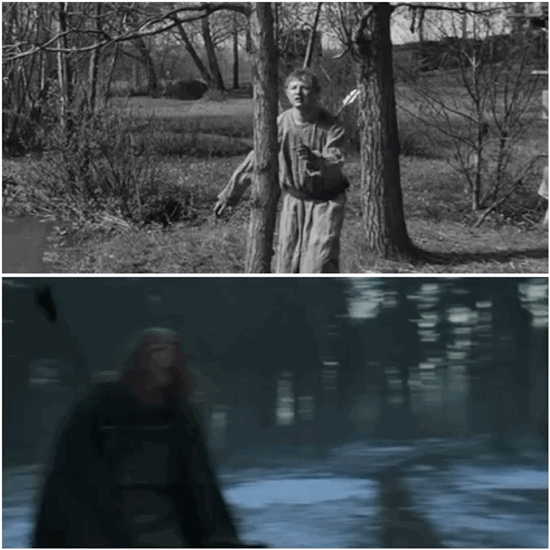Once you're directing, you're kind of in a certain mode, where you're taking whatever is on the page and forming it into the film that you think it might want to be - Gus Van Sant
Although he’s one of the least explored directors on PINNLAND EMPIRE, Gus Van Sant is still a personal favorite of mine (whats strange is that for a GvS fan I can safely say I dislike 40% of his feature filmography and I'm indifferent towards another 20%). From low budget indie maverick (
Mala Noche &
Drugstore Cowboy), to mainstream academy award nominated director (
Good Will Hunting &
Milk), to slightly experimental improvisational art-house auteur (
Gerry, Elephant &
Last Days), Gus Van Sant has gone through quite a few different stages in his three decades of filmmaking.
I chose to explore Van Sant because ever since
Milk (sorry, but I think
The Times Of Harvey Milk is a far superior film and didn’t need to be revisited or "redone") I’ve been falling more & more out of love with his movies (I thought both
Restless &
The Promised Land were pretty flat) and I needed to remind myself why I loved his work so much (next to Abel Ferrara & Takeshi Kitano, this is the largest body of work that we’ve looked at so far and EVERY feature film is represented).
Also make sure to read the one & only Gus Van Sant review on PINNLAND EMPIRE which holds a special place in my heart:
Gerry
Enjoy…
Various Phases: Indie, Mainstream, Arthouse & Beyond...
Next to Richard Linklater & Steven Soderbergh, I can’t think of too many other modern American filmmakers that have gone through so many different style changes. Van Sant has the kind of filmography that makes you go “oh yeah, he
did direct that, huh?” or “really, he directed that?” or “the same guy who made
this made
that??” As you’ll see in this write-up, GvS obviously has many common themes that run throughout all of his movies no matter how different they may be from each other, but he's proven that he can adapt to almost any style or genre.
 |
| Indie: Mala Noche / Drugstore Cowboy / My Own Private Idaho |
 |
| Mainstream: Good Will Hunting / Psycho / Find Forrester |
 |
| Arthouse: Gerry / Elephant / Last Days |
 |
| ???: Milk / Restless / The Promised Land |
Cameos from indie & counterculture figures...
Homosexuality in mainstream cinema
Prior to
Milk (a film about a gay activist); homosexuality was never really “the issue” or main focus in GvS' films. This is pretty progressive in my opinion and it continues down the path that Rainer Werner Fassbinder kinda pioneered in the early/mid-70’s (Fassbinder was another filmmaker to have homosexuality in his work without making it the main focus or “issue”). A lot of the characters in Van Sant’s films are either openly gay (
My Own Private Idaho, Mala Noche, Even Cowgirls Get The Blues, Last Days, Milk) or questioning their sexuality (
Elephant, My Own Private Idaho). And what’s more important is that his work has seeped its way in to mainstream cinema (along with the likes of Todd Haynes & Lisa Cholodenko) without having to compromise anything.
 |
| Mala Noche |
 |
| My Own Private Idaho |
 |
| The Discipline Of D.E. (short) |
 |
| Even Cowgirls Get The Blues |
 |
| Milk |
Surrogate families, father figures & mentors
Parents (especially fathers) of Van Sant's young characters usually aren't around (Finding Forrester, Goodwill Hunting, My Own Private Idaho, etc). And when they are, they're usually irresponsible (at the beginning of Elephant, one of the few adult characters in the film is seen driving drunk and is eventually reprimanded by his teenage son in a strange kind of role reversal) or they usually go unseen (almost all the adults in Paranoid Park are shown just off camera or out of focus in the background). Most of the his young characters are "on the outs" (Goodwill Hunting) or they live on the fringe of society (My Own Private Idaho & Drugstore Cowboy) and have to rely on each other by making a sort of surrogate family of brothers & sisters.
 |
| Goodwill Hunting |
 |
| My Own Private Idaho |
 |
| Drugstore Cowboy |
 |
| Even Cowgirls Get The Blues |
 |
| Good Will Hunting |
 |
| Finding Forrester |
 |
| The Sea Of Trees |
Dream zone achieved
Van Sant’s cinema sometimes features characters that are dreamers (
Mala Noche & Even Cowgirls Get The Blues), deep thinkers (
Finding Forrester) or are prone to zoning out or drifting off for various reasons ranging from drug use (
Drugstore Cowboy) & narcolepsy (
My Own Private Idaho) to dehydration from being stranded out in the desert (
Gerry).
 |
| Drugstore Cowboy |
 |
| Elephant |
 |
| Last Days |
 |
| My Own Private Idaho |
 |
| Mala Noche |
Loneliness, Depression & Despair
There’s an understated sorrow within half of Van Sant’s filmography. There’s usually some type of looming anxiety (
Paranoid Park), major depression (
Last Days), pressure (
Finding Forrester) or despair (
Gerry &
Last Days) weighing on half of his characters. And often times these characters lose the battle (
Last Days,
Elephant,
Gerry) or things are left ambiguous or open ended on a slightly negative tone (
Paranoid Park,
Mala Noche)
 |
| Elephant |
 |
| Finding Forrester |
 |
| Gerry |
 |
| Last Days |
.jpg) |
| Paranoid Park |
 |
| The Sea Of Trees |
Influences, True Stories, Adaptations & Remakes
Like Stanley Kubrick (GvS’ personal favorite filmmaker), almost all of Van Sant’s films are derived from pre-existing books (
Even Cowgirls Get The Blues,
Mala Noche, Tulsa), true stories/true events (
Milk, To Die For, Last Days,
Elephant &
Drugstore Cowboy) or older films (
Psycho). But no matter what, he puts his own unique stamp on everything he does…
 |
| Drugstore Cowboy (some of the events in Drugstore Cowboy were loosely based on Larry Clarke's photography book Tulsa) |
 |
| The Wizard Of Oz/Drugstore Cowboy/My Own Private Idaho |
.jpg) |
| Even Cowgirls Get The Blues |
 |
| Columbine (Elephant) |
 |
| Kurt Cobain (Last Days) |
 |
| Pamela Smart (To Die For) |
.jpg) |
| Harvey Milk (Milk) |
 |
| Psycho |
Portland
Like Todd Solondz (New Jersey), Abel Ferrara ( New York City), vintage Michael Mann (Chicago), Terrence Malick (Texas/Oklahoma) and a handful of other modern filmmakers, Van Sant always makes it a point to rep his hometown (8 of his 15 films take place in Portland). From His very first feature (
Mala Noche) to his more recent work (
Restless), Portland has always remained a consistent backdrop.
 |
| Drugstore Cowboy |
 |
| My Own Private Idaho |
 |
| My Own Private Idaho |
 |
| Mala Noche |
 |
| Paranoid Park |

.gif)





























.jpg)















































.jpg)



.jpg)




.jpg)





